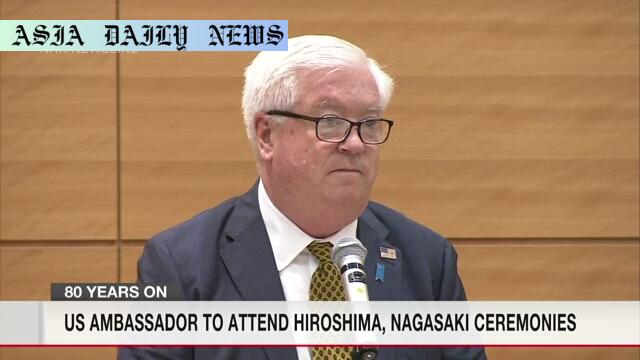Anniversary: US Ambassador George Glass to represent America at Hiroshima and Nagasaki Peace Memorial Ceremonies.
- US Ambassador George Glass will represent the United States at Hiroshima and Nagasaki Peace Memorials.
- The attendance marks the 80th anniversary of the atomic bombings of these cities.
- This is Glass’s first visit to these cities since taking office.

Introduction: Commemorating 80 Years of Resilience and Peace
The United States Ambassador to Japan, George Glass, is set to represent the United States at the memorial ceremonies marking the 80th anniversary of the atomic bombings of Hiroshima and Nagasaki. These solemn events are reminders of one of the most profound moments in human history. By attending these ceremonies, Ambassador Glass seeks to embody the spirit of reconciliation, peace, and hope that these cities have come to represent.
According to the US Embassy in Japan, Ambassador Glass will be present at the Hiroshima Peace Memorial Ceremony on August 6, followed by the Nagasaki Peace Memorial Ceremony on August 9. This will be his first visit to the commemorative events since assuming his role in April. His participation signals the enduring ties between the United States and Japan, which have transformed their relationship from one of conflict to one of partnership and mutual respect.
Significance of the Anniversary: Honoring Victims and Promoting Peace
This year’s commemoration holds special importance, as it marks eight decades since the devastating atomic bombings that claimed tens of thousands of lives and altered the course of global history. The ceremonies are designed to honor those who lost their lives and those who endured the aftermath. However, they also serve as powerful reminders of the resilience of the survivors and the importance of advocating for global peace.
This milestone year has garnered the participation of international dignitaries from diplomatic missions across the globe. Nagasaki City extended invitations to all countries, emphasizing inclusivity. This marks a shift from last year, when certain nations were excluded from the ceremonies due to political sensitivities. The city’s decision reinforces a commitment to ensuring the event remains a platform for reflection, unity, and reconciliation.
Reconciliation and the Role of Diplomacy
Ambassador Glass’s attendance exemplifies the role that diplomacy plays in fostering reconciliation between nations with complex histories. His statement highlighted the enduring message of hope and unity shared by the people of Hiroshima and Nagasaki. This forms a crucial reminder that even amidst the tragedy of war, humanity can aspire to rebuild, heal, and work towards a more peaceful future.
The ambassador’s appearance at these ceremonies is also a testament to the maturing partnership between the United States and Japan, which now encompasses shared values, extensive economic ties, and collaboration on global challenges such as climate change and security. It demonstrates how former adversaries can become allies rooted in mutual trust and respect over the years.
Looking Ahead: Lessons from the Past
The message of Hiroshima and Nagasaki resonates far beyond the anniversaries themselves. The quest for peace remains as relevant today as it was 80 years ago, particularly as the world grapples with ongoing conflicts and increasingly complex security challenges. This year’s participation by representatives from various nations underscores the universal understanding that the lessons from these historic events must not be forgotten.
Finally, the commemoration emphasizes the enduring relevance of promoting a nuclear-free world, a vision shared by many but challenging to achieve. These ceremonies are a call to action for policymakers, world leaders, and ordinary citizens alike to work collectively in ensuring that the legacy of Hiroshima and Nagasaki inspires actions towards a safer and more peaceful future.



Commentary
Reflecting on the Importance of Peace Memorials
The upcoming 80th anniversaries of the atomic bombings of Hiroshima and Nagasaki serve as stark reminders of the devastation caused by nuclear weapons. Beyond the immediate destruction and loss of life, these bombings have left deep scars on global consciousness and shaped the course of modern history. The participation of the US Ambassador at these ceremonies represents more than a diplomatic visit—it symbolizes the power of reconciliation and the possibility of moving forward from past transgressions.
Reconciliation Through Shared Humanity
What stands out about these commemorative events is not just the focus on mourning the victims, but also the profound message of peace and unity that they convey. Hiroshima and Nagasaki have emerged as global symbols of resilience, healing, and hope. Ambassador Glass’s presence highlights the importance of acknowledging the past while striving to foster meaningful connections with those once considered adversaries. It’s a testimony to the transformative power of shared humanity—a lesson that the world desperately needs today.
A Timely Reminder in a Troubled World
Amidst rising geopolitical tensions and the renewed focus on nuclear capabilities in some parts of the world, the messages emanating from Hiroshima and Nagasaki are timelier than ever. As we commemorate these tragic events, let this be a moment of reflection for global leaders and citizens to commit to peacebuilding efforts. Progress may be slow, but practicing diplomacy and fostering international cooperation is crucial in ensuring that history doesn’t repeat itself.
In conclusion, the solemn ceremonies marking the 80th anniversary of Hiroshima and Nagasaki are more than memorials—they are reminders of the immense responsibility humanity bears to learn from its past and choose a future rooted in peace over conflict.